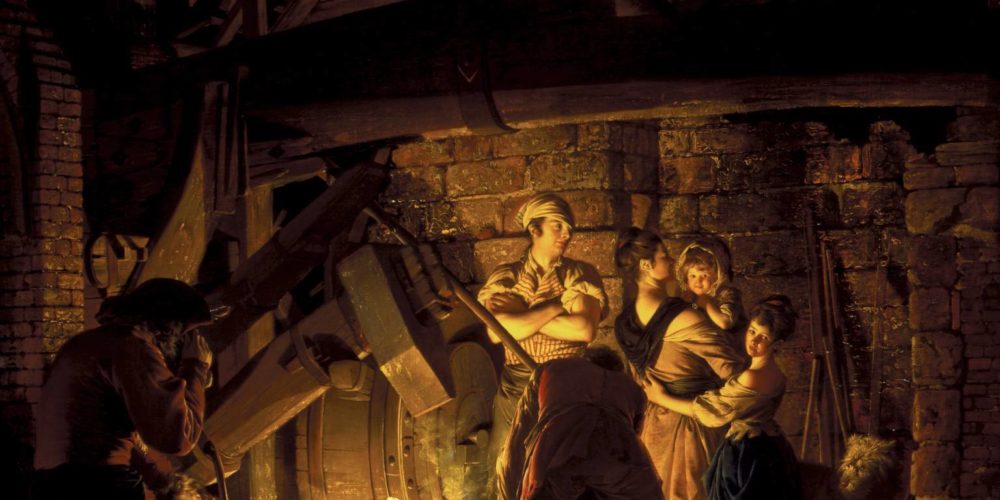Out of the green fields of southern England, in the same century in which Shakespeare penned his pastoral comedies and the Tudors initiated a new phase of Ireland’s conquest, a novel form of economics arose. A terrible force, only nascent, long since held at bay by previous societies, brought a new motive and logic to land-ownership and production that would shortly transform England and, within a couple of centuries, the entire planet.
The essential distinction was the domination of market economics. Before this economic revolution the price of land had been governed by custom, rents being fixed often for centuries without alteration. Landlords began to judge their property’s value not by customary tenure but by the potential economic output of the land: how much profit could be made from it. Maximum exploitation became an economic necessity; the propertied who did not adhere to this soon found themselves propertyless.
The mother and father of wealth—nature and human labour—came to be viewed solely as a means of producing economic value, with concern for their well-being and longevity featuring rarely in account books.
All other forms of property and relations with the land that did not follow market logic—common land, customary rights, peasant holdings—were eliminated before the all-encompassing, ever-expanding profit motive. The peasantry (and small-scale farmers) were violently removed from their land in order to produce profitable crops or animals—look only to India, Senegal, Sudan or Colombia to see this process in real time.
This now dominant class, having seized the means of production (lands, resources, machinery, labour, etc.) from the majority, invested not to produce a particular need or want but to accumulate greater value for their capital. It was the onset of these capitalist social relations that fundamentally broke, what Marx called the metabolic rift between humanity and nature: the give-and-take connection that humanity was reared on.
The destruction of this link has only deepened with continued capitalist expansion. Inevitably, our relationship with the earth has become entirely parasitic and destructive.
If this system had remained an English or even a European phenomenon there would be no fear of environmental breakdown; but this is antithetical to capitalism’s fundamental nature. The need to expand has brought its destructive logic to the whole planet.
Imperialism is capitalism’s international manifestation. England’s centuries-long conquest of Ireland transformed and intensified concurrently with the development of English capitalism. Within a century, traditional Irish society had been virtually wiped out.
This process has taken place on every continent on the globe, violently rendering the majority of the world’s peoples economically tied to and dependent on the imperial core.
Following the onset of modern monopoly capitalism in the late nineteenth century, with increased domination by finance capital, imperialism intensified. As one indication of this seismic transformation, from owning 10 per cent of Africa in 1876, Europe suddenly owned 90 per cent of the continent by 1900. An entire continent was violently rendered a dependency of Europe, the profits of imperialists now the society’s motive force, replacing the primarily peasant-based economies of before.
The degradation and ruin done to the continent and its people by imperialism, alongside most of Asia and Latin America, was, and is, disastrous—for both people and the planet. The global masses have been dispossessed of their connection to and ownership of the soil and forced into obedience to international capital and profiteering in order to survive.
The current crisis moment, this fatal juncture in the history of humanity, was evidently many centuries in the making, yet the specificity of the current historical epoch—capitalism’s current stage of development—cannot be ignored. The total domination of finance capital has stretched capitalism’s contradictions to their limits, leading to an even more frenzied quest for avenues of capital investment and maximum returns.
This took place concurrently with the fall of socialism in much of Asia and Europe, devastating the planet’s delicate environment. Vast swathes of the earth that were centrally planned were thrust into the anarchy of the global capitalist economy, economies run in the interests of people giving way to neo-colonial economies run in the interests of the financial elite. Natural resources were brutally exploited to feed capital accumulation—such as the vast forests of Russia, conserved and even expanded under the Soviet Union. This drastic decline in workers’ power saw global capital brutally reassert its power, stripping hard-won environmental protections.
The total domination of finance capital, followed by its expansion across the earth’s surface, has brought about unbridled environmental destruction. Even the capitalist class now openly accepts that human extinction is inevitable, given the present course. But even in the face of this immediate threat of extermination by means of an overheated earth, the violent forces of capital and its ideology, liberalism, keep much of the working class from seizing power for itself and ending our death spiral.
Anything except capital accumulation is blamed: overpopulation, the consumption of meat, industrialisation by former colonised countries—the problem is either individualised or put on the masses of the global south. The extraordinarily few corporations producing the vast majority of carbon emissions are ignored.
Unless humanity does away with the arbitrary domination of capital, and its endless need to expand and wreak destruction, our survival beyond the next generation or two is doubtful.
Sources and further reading (all available on line)
- John Bellamy Foster, “Late Soviet ecology and the planetary crisis,” Monthly Review, June 2015.
- John Bellamy Foster and Brett Clark, “The paradox of wealth: Capitalism and ecological destruction,” Monthly Review, November 2009.
- V. I. Lenin, Imperialism: The Highest Stage of Capitalism.
- Fred Magdoff, “Twenty-first-century land grabs: Accumulation by agricultural dispossession,” Monthly Review, November 2013.
- Karl Marx, Capital, vol. 1, chap. 15 (§ 10), p. 26–31.
- Michael Parenti, Blackshirts and Reds: Rational Fascism and the Overthrow of Communism (San Francisco: City Lights, 2001), chaps. 6, 7, 9.
- Ellen Meiksins Wood, The Origin of Capitalism: A Longer View (London and New York: Verso, 2002), chaps. 5–7.






